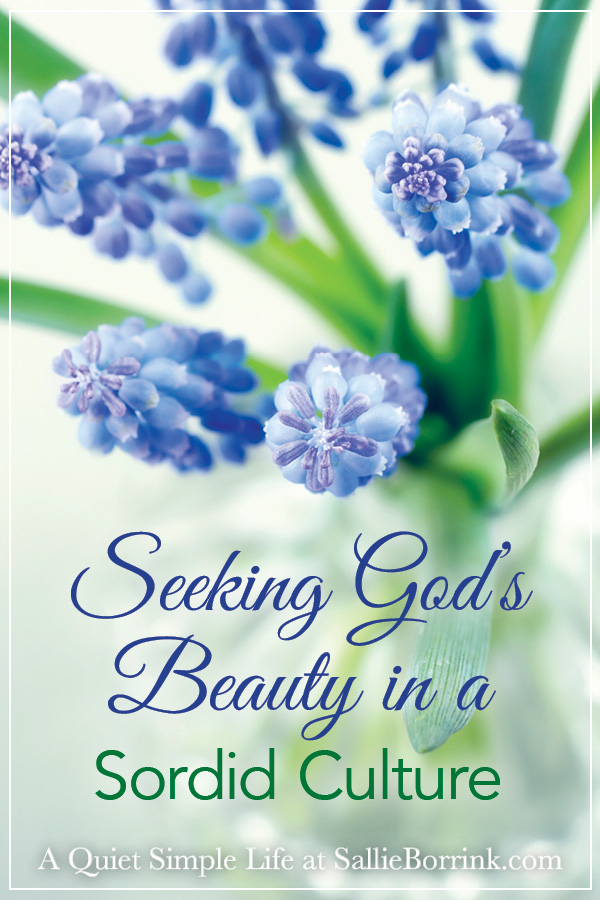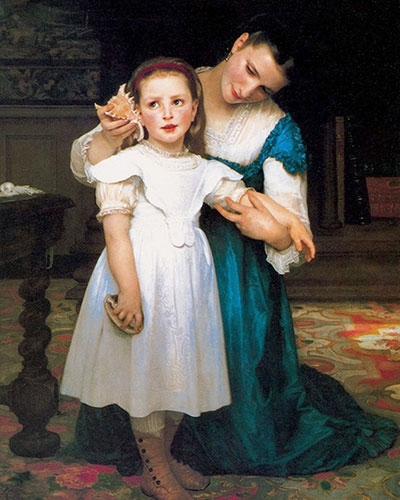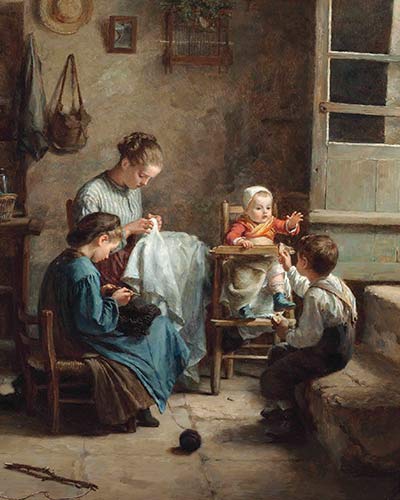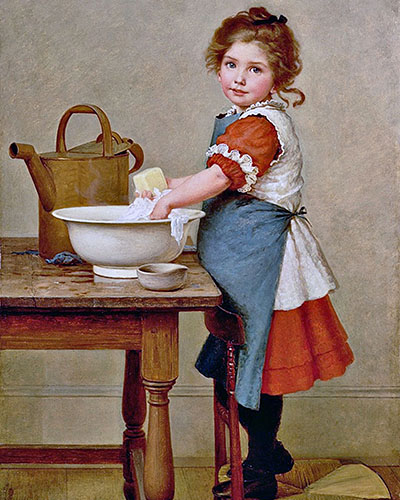I chose Beautify as my word for 2020 for a few reasons. One, as a statement against the ugliness of the culture at this moment. Two, as a reminder of the real need I have for beauty in my life. Three, to spur me on to not just think about beauty, but to also use it as a measuring stick for how I choose to live each day, what I purchase, what I read and look at, what I wear, etc.
In this post, I wanted to spend some time thinking a little bit about the idea of seeking God’s beauty in a sordid culture.
A Sordid Culture
We don’t see the word sordid used very frequently. It popped into my head because an author I’ve read my entire life (Grace Livingston Hill) often used it. Hill frequently showed the stark contrast between Christian beauty and worldly sordidness in her stories and so it has become a part of my own vocabulary.
Synonyms for sordid include ideas such as:
- being below the normal standards of human decency and dignity
- a loss or lack of some essential high quality of mind or spirit
- degradation, debasement, or servility
- stressing physical or spiritual degradation and abjectness
A list of synonyms for sordid includes: base, contemptible, currish, despicable, detestable, dirty, dishonorable, execrable, ignoble, ignominious, low, low-down, low-minded, mean, nasty, paltry, snide, vile, and wretched.
(So even secular sources such as an online dictionary and a thesaurus clearly see the stark contrast in the world even if they don’t fully understand the truth behind it.)
The reality is we are living at a time in this culture when people are pushing and advancing sordidness as much as possible. What we are experiencing isn’t simply a sad and lamentable result of living in a fallen world. Sordidness is celebrated by people who are pushing the boundaries in nearly every conceivable way.
Sadly, they are pushing them even within the body of Christ.
Sordidness in the Church
There is no doubt that sordidness has crept into many parts of the church. Not only has it crept in, but it has been welcomed in. The doors have been thrown open to welcome in every kind of degradation and low quality imaginable.
Please understand I am not talking about welcoming sinners who are searching for the Truth and calling them to repentance and faith in Christ. I am talking about bringing the base and profane into the church and accepting it as a valid part of walking with Christ and being led by the Holy Spirit.
This includes embracing parts of our culture that stand in stark contrast or even direct opposition to the beauty and holiness of God. Holiness has actually become a dirty and divisive word in many churches today. The pursuit of holiness is somehow seen as a negative, a weapon to prove that you are better than someone else rather than a real and vital part of being Christ’s disciple. Accepting sordidness is preferred by many to holiness.
Noble and Virtuous
To flip this around, antonyms for sordid include:
- high
- high-minded
- honorable
- lofty
- noble
- straight
- upright
- venerable
- virtuous
These are words that are held in contempt by many in our culture, including in the church. When was the last time you heard a believer encouraged to be noble, high-minded, upright, or virtuous outside of a ministry specifically geared toward promoting those values? Can you imagine the scorn that would be heaped upon the Christian who chose the thoroughly biblical word “Upright” for 2020 and wrote about it online? How dare someone think that pursuing something praised over and over again in the Scriptures is somehow acceptable today? If anything, stating a desire to be a noble person or a virtuous woman is seen as a personal attack on the listener as though it implies some kind of judgement against him or her.
How quickly we forget that a virtuous woman is spoken of in the highest of terms in the Scriptures. There should be no doubt as to the value of desiring to be such a woman.
But the idea of being a virtuous woman is regularly attacked and belittled.
Some of this is due to the erroneous mingling of radical feminism and biblical theology by those who desperately want to find a way to be acceptable to the sordid culture leaders and the LORD.

Some of it is due to the fact that ministries that once championed these ideas collapsed in spectacular fashion, wounding an entire generation and leaving many bitter people behind to pick up the pieces in their homes and families. The idea of a virtuous person, especially a virtuous woman, is anathema to them because of those who profited from peddling it and then abandoned the truth for a lie. The former followers of these failed leaders struggle to separate the biblical truth of a virtuous person from the failures of the leaders they trusted.
But a virtuous woman reflects the beauty of God and no failings of men or churches should prevent us from still pursuing this truth.
Teaching on God’s Beauty
I’m trying to remember the last time I heard someone speak, preach, or write about the beauty of God and how that should impact our life. I honestly don’t know. Cornerstone doctrines such as God’s truth, goodness, and beauty have fallen out of style in our churches.
I decided to look online for articles and such about the beauty of God. I was not surprised to find only a few and they were written by the men I would expect because they are men with a more fully developed theology of God (whether you agree with their particular denominational bent or not). Here are a few that I found:
- Our Beautiful God by R.C. Sproul
- How Pervasive and Practical Is the Beauty of God? by John Piper
- The King in His Beauty by Charles Haddon Spurgeon
- The Beauty of the Lord by J. R. Miller
I also found this podcast about this book:
- How Can I See the Beauty of God? (podcast with written transcript)
- The Beauty of the Lord: Theology as Aesthetics by Jonathan King
One other book related to beauty in terms of art is this:
- Art and the Bible by Francis Schaeffer
Pointing People to God’s Beauty
We who know Christ have the opportunity to point people to the beauty of God. We can do this in the way we speak, what we speak about, and the way we interact with people around us. We have churches, homes, schools, and workplaces filled with people who know nothing of the beauty of God. Nothing. It is far more likely that they associate God with the very opposite of beauty since so many who profess the name of Christ do, speak, and promote things contrary to God’s beauty and goodness.
And yet that hunger and desire for beauty is within each of us because we are created in the image of God. We are designed to respond to the beautiful. Thinking about the beauty of God and sharing the truth of it with others can be a bridge for reaching out to discouraged and lost people overwhelmed by the sordidness that drags them down without even fully understanding why it does. We have a beautiful God to point them to and we should do what we can in our own lives and circumstances to spread beauty whenever possible.
Followers of Christ also need the beauty of God each day. We need to be reminded of the truth of the great and glorious God we serve. Even as we go about our daily life and are tempted to discouragement or even despair over the sordidness that seems so pervasive, we can refocus our mind and our eyes on the beauty of God, the beauty of our forgiveness, and the beauty of the Holy Spirit guiding us.















 In Our Cozy Home This Week No. 11 – Decluttering My Wardrobe, Making Progress
In Our Cozy Home This Week No. 11 – Decluttering My Wardrobe, Making Progress
Psalm 119 has a lot of that sense of standing alone in a debased culture. Maybe it is extra-long to provide extra encouragement in that situation.
Hi Peggy,
Thank you for mentioning that. I’m going to take some time this weekend and read through Psalm 119. I just wrote it on a sticky note in front of me so I remember. 🙂
Sallie
This is such a wonderful post, Sallie. I totally agree with everything. We, as women, have such an immense responsibility to be the ones who look for the beauty and bring it to our family and friends and I have to admit that I’m up to that challenge (no matter what this world says or does)!!!!!!! : ) Thank you, again, for this post.
Mary S.
Hi Mary,
Good to see you! I’m glad you enjoyed the post. I agree that women can make such a tremendous difference in this part of our homes and culture. I hope that I can encourage other women to embrace and enjoy this part of life. It is a gift we can give to others and that is no needed.
Sallie